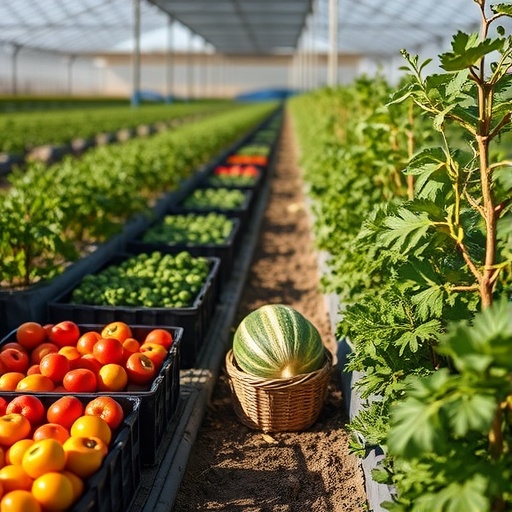A groundbreaking study conducted by researchers at the Hebrew University of Jerusalem has brought to light the complex and costly realities of food self-sufficiency in Israel. While the nation could, in theory, produce enough plant-based food locally to sustain its population, the economic and agricultural implications of achieving full autarky paint a far less optimistic picture. This innovative research leverages advanced economic modeling to explore the viability and consequences of complete food independence, offering crucial insights for policymakers and agricultural strategists alike.
At the heart of this study is the newly developed VALUE model—Vegetative Agriculture Land Use Economics—a sophisticated partial equilibrium framework designed to analyze the agricultural sector’s capacity to meet the country’s dietary demands under various scenarios. By applying this model to Israel’s 2019 agricultural data, the research team delved into the possibility of the nation locally producing the recommended EAT–Lancet Commission’s plant-based diet, offering a granular assessment of the land, labor, and capital reallocations required to reach such self-sufficiency.
The findings reveal a stark reality: Israel could sustain a vegetarian diet internally but would struggle to maintain its current level of animal-based food production if external food imports were severely restricted. This distinction is pivotal, as livestock feed relies heavily on imported resources, making total food self-sufficiency an unattainable goal without sacrificing significant elements of the current food system. The study emphasizes that while the agricultural sector can pivot toward plant-based food production, such a shift involves substantial trade-offs.
Profound economic impacts underpin the study’s conclusions. Achieving full food self-sufficiency would necessitate enormous public subsidies to offset welfare losses, which the study estimates at approximately $1.5 billion annually. These costs largely fall on farmers, who would experience decreased farm diversity and economic losses as agricultural resources are redirected away from Israel’s established strengths in fresh fruit and vegetable production toward more land-intensive staple crops such as cereals, oils, and legumes.
This transition poses a paradox. While cereals and legumes require less water and labor compared to fruits and vegetables, their land-intensive nature strains an already limited agricultural area. The finite arable land within Israel emerges as a bottleneck in the quest for self-sufficiency, forcing the agricultural sector into a difficult balancing act between optimizing land use and maintaining output diversity—challenges that heighten the risk of diminished food quality and variety.
The research further highlights a demographic challenge that cannot be overlooked. Israel’s growing population will only exacerbate pressures on agricultural land and production capacity. Without increasing arable land, improving crop productivity, or significantly expanding food storage infrastructure, full plant-based food self-sufficiency will become increasingly unattainable for future generations. This underlines the imperative for long-term agricultural planning that anticipates demographic trends and integrates technological advancements in farming practices.
Beyond the raw economics, the study offers an important policy framework that advocates for a balanced strategy. Instead of pursuing the costly and impractical goal of total self-sufficiency, the researchers argue for a multifaceted approach combining targeted agricultural innovation, diversified import sourcing, and strategic food storage. Such a diversified strategy is more resilient to external shocks while avoiding the pitfalls of extreme resource reallocation within the domestic agriculture system.
The timing of this research is especially critical, given recent global upheavals. The COVID-19 pandemic and regional disruptions, including ongoing challenges to Red Sea shipping routes, have exposed vulnerabilities in Israel’s dependence on global food supply chains. The VALUE model developed by the team has already been integrated into Israel’s National Plan for Food Security 2050, signaling its immediate relevance and application in shaping the future landscape of the country’s food policies and national security.
The study meticulously dissects the welfare implications, revealing that the subsidies needed to sustain full self-sufficiency would not just burden the government but would also reduce overall consumer and producer welfare. The phenomenon where producers—farmers in this instance—disproportionately bear economic costs illustrates the complexity of transitioning agricultural priorities in a highly specialized economy and the risks of neglecting balanced policy objectives.
Furthermore, this research underscores the nuanced relationship between food security, sustainability, and economic viability. By focusing on plant-based diets, the study aligns with global calls to reduce environmental impact through dietary shifts. Nevertheless, the transition to full plant-based local production would require major agricultural restructuring, including potentially controversial shifts away from high-value crops and traditional farming practices, thereby elevating the sociopolitical challenges tied to food system reforms.
Prof. Iddo Kan, lead author of the study, encapsulates the research’s core message with a compelling appeal: the goal is not to dismiss the value of local agriculture but to foster smarter policy frameworks that fortify national food security without simultaneously undermining the livelihoods of the very farmers integral to the system’s success. This sentiment echoes the wider global dialogue on balancing food sovereignty with economic sustainability and agricultural resilience.
In summary, this pioneering research elucidates the substantial economic costs, land constraints, and demographic factors entwined with Israel’s pursuit of food self-sufficiency. Through the deployment of a cutting-edge economic model and detailed analysis of agricultural supply chains, the study offers a forward-looking blueprint. It calls for measured, innovative policy responses that blend local production enhancement with international trade diversification and storage infrastructure, ultimately advocating for a sustainable and resilient national food system in an era of increasing unpredictability.
Subject of Research: Economic evaluation of food self-sufficiency and agricultural capacity in Israel using advanced modeling techniques.
Article Title: Economic analysis of food self-sufficiency: modeling and application to the case of Israel
News Publication Date: 15-Oct-2025
Web References: 10.1016/j.foodpol.2025.102979
Keywords: Food policy, Agriculture, Nutrition




